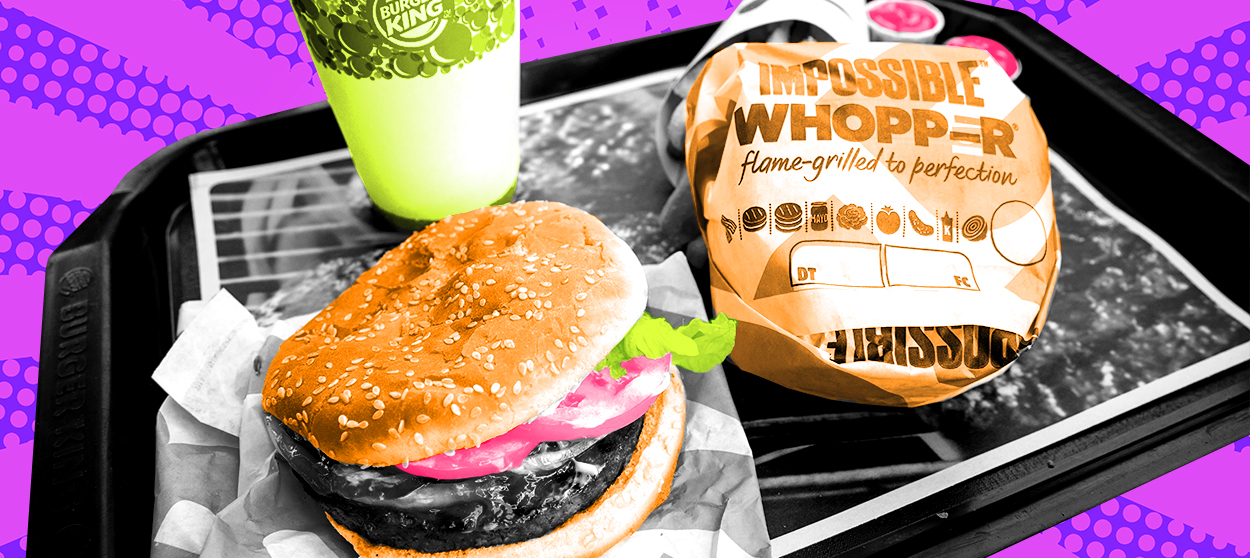The joy and promise of Burger King's Impossible Whopper
A reason for optimism at the drive-through


A free daily email with the biggest news stories of the day – and the best features from TheWeek.com
You are now subscribed
Your newsletter sign-up was successful
Burger King's new Impossible Whopper is exactly what it claims to be: a vegetable product that looks exactly like a thin, gray, lumpy fast-food beef patty — and tastes like one too. If you ordered it with all the standard Whopper toppings — including, ugh, mayo — and gave it to somebody who asked for the real thing, he probably wouldn't notice. The idea of eating one of these on a Friday fills me with holy dread. But paired with fries and Dr. Pepper on a Tuesday afternoon? It's one of the least-bad things I've felt guilty spending $6 on from a monarchy-themed mass-produced food retailer in some time.
We have certainly come a long way from the soggy corn-flavored lumps that are still called "veggie burgers" on the menus of bars, even in rural southwest Michigan. The Impossible Burger is a miracle of engineering, a triumph of sheer human ingenuity on par with the Jacob's Creek suspension bridge or the invention of the washing machine. It puts to shame the aspirations of medieval alchemists, who I'm sure would agree with me that turning one kind of hard metal into another is far less impressive than transforming soy and potatoes into factory-farmed cow flesh. The idea that it exists at all fills me with joy and a feeling of promise.
Does it matter, though? Yes, because unless we want the entire planet covered in pink radioactive hog excrement in 50 years, we are all going to have start eating a lot less meat. It has nothing to do with lunatic arguments about the "ethics" of killing dumb animals, and everything to do with responsible stewardship of creation — though as it happens the processes inherent in factory farming as we know it are insanely cruel. This has been clear for ages, but unlike so many of the other existential crises we face, I think that solving it will be remarkably easy. We are not destroying our landscapes and creating poop lagoons visible from space in order to sell $50 cuts of steak — we're doing it to make cheap meat products that will be created under industrial conditions, prepared by an assembly line, and eaten out of a bag.
The Week
Escape your echo chamber. Get the facts behind the news, plus analysis from multiple perspectives.

Sign up for The Week's Free Newsletters
From our morning news briefing to a weekly Good News Newsletter, get the best of The Week delivered directly to your inbox.
From our morning news briefing to a weekly Good News Newsletter, get the best of The Week delivered directly to your inbox.
Which is why I am optimistic about the possibility of replacing cheap meat with things like the Impossible Burger. We already see this at places like Taco Bell, where a priest of my acquaintance once argued it was probably borderline acceptable to eat on a Friday given the plant-based composition of what appears inside their bargain menu "beef" tortillas.
All of this will make gourmets blanche, and it probably should. The fact that we are so indifferent to what we shovel into our faces that we probably won't even notice whether it comes from beans or steers says a lot about the nature of modern consumption. Only a society as screwed up as ours could be one in which the poorest people are also the fattest.
In the meantime, there is still a long way to go. Asked how the sandwich was doing at my own local franchise, the drive-through man responded that it was being outsold nearly two-to-one by Burger King's disgusting-sounding new $1 taco. Can we start doing those with Impossible "meat" as well?
Restoring sanity to meat production — and to all the other things that are wasteful and destructive about the globalized capitalist economy — will require a lot more than banning plastic straws and convincing drunk college students to eat potato patties instead of real Whoppers. Fast food as we know it will probably have to disappear, along with the rapid pace of commerce that all but necessitates it. But these are issues for another time.
A free daily email with the biggest news stories of the day – and the best features from TheWeek.com
Today, let's raise up our plastic soda-filled glasses to the King.
Matthew Walther is a national correspondent at The Week. His work has also appeared in First Things, The Spectator of London, The Catholic Herald, National Review, and other publications. He is currently writing a biography of the Rev. Montague Summers. He is also a Robert Novak Journalism Fellow.
